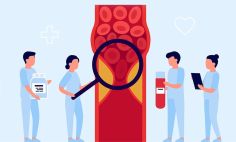NIH Research
Featured Articles : NIH Research

New pancreatic cancer research may improve detection and treatment
About 1.7% of people in the United States will be diagnosed with pancreatic cancer at some point in their lives. Despite...
Cancer, NIH Research, Pancreatic cancer
What makes urine yellow? The answer lies in your gut
Ever wonder why urine is yellow or why skin looks yellow in people with jaundice? Scientists have known for more...
NIH Highlights, NIH Research
Of mice and medicine: Our favorite NIH research highlights from 2024
1. Could a new molecule prevent blood clots without increasing the risk of bleeding? Blood clots can form when substances in...
NIH Highlights, NIH Research
4 discoveries beyond the brain
Neurodegenerative diseases—such as Alzheimer’s disease, Parkinson’s disease (PD), Lewy body dementia (LBD), and amyotrophic lateral sclerosis (also known as ALS...
NIH Research, Lewy Body Dementia, Parkinson's disease
Can bacteria in your gut make you want to exercise?
Have you ever wondered why some people enjoy exercise while others find it unbearable? New research hints at a surprising...
NIH Research, Exercise
More than two decades of NIH research gives answers on a rare disease affecting bones, skin, and the endocrine system
Why do patients with fibrous dysplasia/McCune-Albright Syndrome break their bones so easily? Or hit puberty as early as infancy?...
NIH Research, Rare Diseases, Dental Health, Skin Conditions
H20 for healthy aging
Water is essential for just about every function in our bodies, from keeping our organs working properly to regulating our...
NIH Research, Healthy Aging, Nutrition
How researchers at the National Heart, Lung, and Blood Institute are unblocking the science of blood clots
Blood clots can form when substances in the blood clump together. While this is a normal part of the healing...
Blood Clots, NIH Research
Exploring ADHD…with science!
Attention-deficit/hyperactivity disorder (ADHD) affects millions of people worldwide. We know more about ADHD than we used to, but there’s...
NIH Research, ADHD
Big lessons from small creatures
For centuries, scientists have used small animal models to study everything from how genes work to how diseases develop. And...
NIH Research, Rare Diseases, Eye Disease


